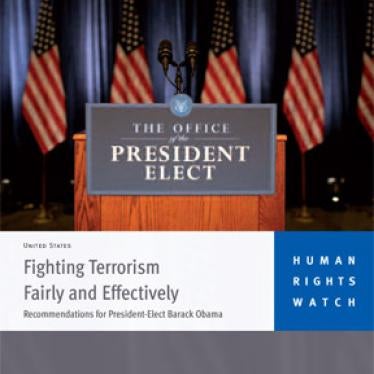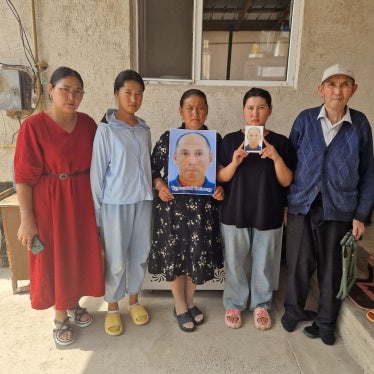Dear Attorney General Holder,
As the United States government conducts its review of the detainees currently held at Guantanamo, we urge you to expedite and give special consideration to five detainees who were apprehended and transferred to Guantanamo while still juveniles. Each of these five individuals has been held in US custody for over six years, but has been denied basic juvenile justice protections or special consideration because of their potential status as former child soldiers.
The five detainees are the following:
Mohammad El Gharani: El Gharani is a Chadian national who was born and raised in Saudi Arabia. He was brought to Guantanamo in early 2002 at the age of 15, after being arrested in a mosque in Karachi, Pakistan. He has been held in isolation in Camps 5 and 6, and has tried to commit suicide at least seven times. He has slit his wrist, run repeatedly headfirst into the side of his cell, and tried to hang himself. On January 14, 2009, US District Judge Richard J. Leon ordered El Gharani's release, ruling that the government's evidence was too weak to justify the young man's continued confinement.
Mohammad Jawad: Jawad, an Afghan, was initially detained at Bagram and transferred to Guantanamo in early 2003. He was charged before a military commission with attempted murder for allegedly throwing a hand grenade into a US army vehicle in Afghanistan in December 2002, when he was 16 or 17 years old (he does not know his exact age). Two US soldiers and their Afghan translator were severely injured in the incident. Jawad tried to commit suicide about 11 months after arriving at Guantanamo, and military records showed that during a 14-day period in May 2004, he was moved from cell to cell 112 times as part of a sleep deprivation regime known as the "frequent flyer program." In November 2008, the judge in his case, Col. Stephen Henley, ruled that confessions obtained from Jawad while in US custody were inadmissible in his trial because they were "tainted by torture."
Omar Khadr: A Canadian national, Khadr was charged before a military commission for allegedly throwing a grenade that killed a US soldier during a firefight in Afghanistan in July 2002, when Khadr was 15 years old. Khadr was severely wounded in the firefight, initially detained at Bagram, and transferred to Guantanamo in November 2002. He has been held in prolonged solitary confinement, and has said that his interrogators shackled him in painful positions, threatened him with rape, and used him as a "human mop" after he urinated on the floor during an interrogation session. He was detained for more than two years before being provided access to an attorney.
Mohammad Khan Tumani: Khan Tumani, a Syrian, has been detained since he was 17, and is held in solitary confinement without access to his father, who is also detained at Guantanamo. Khan Tumani's attorneys state that Khan Tumani has been subject to coercive interrogations and physical and psychological abuse, including beatings, temperature extremes, sleep deprivation, and threats that his family would be killed. In December 2008, he cut a vein in his hand in an apparent suicide attempt. Other detainees have told his lawyers that Khan Tumani has beat his head against the walls of his cell for hours at a time and smeared his cell with excrement.
Fahd Abdullah Ahmed Ghazi: Fahd Ghazi, a Yemeni, was on the third planeload of detainees to Guantanamo in January 2002, at age 17. Although he has been cleared to leave Guantanamo for well over a year, he remains stuck in Guantanamo pending an agreement between the US and Yemen to return him there. His daughter who was two months old at the time of Ghazi's arrest is now 8 years old. The two reportedly send drawings back and forth to each other regularly. He is now being held in the communal setting of Camp 4, but was previously held in the more restrictive camps where detainees are locked into a single cell 23 hours a day.
Throughout the detention of El Gharani, Jawad, Khadr, Khan Tumani, and Fahd Ghazi, the United States has flouted international juvenile justice standards that acknowledge children's unique vulnerability, lower degree of culpability, and capacity for rehabilitation. International treaty law and accepted juvenile justice norms require governments to provide children (defined as persons under the age of 18) with special safeguards and care. They stipulate that the arrest and detention of children must be used only as a measure of last resort and for the shortest appropriate period of time, and that such cases must be handled as "speedily as possible," with rehabilitation and social reintegration as a primary consideration. Juvenile detainees must be separated from adults, allowed contact with their families, and have the right to special care and assistance, including access to education, recreation, and rehabilitation.
All of these rights have been denied El Gharani, Jawad, Khadr, Khan Tumani, and Fahd Ghazi. They have each been detained for more than six years without a resolution of their case. For years, they were denied any educational or rehabilitative opportunities. Any contact with their families has been extremely limited. Three of the five (Jawad, Al Gharani and Khan Tumani) are currently held in what is essentially solitary confinement (in camps 5 and 6), and a fourth, Khadr, has only been recently moved to a communal living setting after spending years in extreme isolation. The detrimental effect of prolonged detention and isolation (shown by studies to be particularly pronounced for juveniles) is evidenced by the suicidal behavior and apparent signs of mental deterioration in at least several of these cases.
In addition to being bound by treaties governing juvenile justice, the United States is also party to treaties that recognize the special situation of children who have been recruited or used in armed conflict. The Optional Protocol to the Convention on the Rights of the Child on the involvement of children in armed conflict prohibits the use of children under age 18 in armed conflict and obliges the US to support the rehabilitation and social reintegration of children who have been recruited or used in violation of the protocol.
We note that as a US Senator, President Obama co-sponsored two pieces of legislation related to child soldiers that were both adopted by Congress and enacted into law in 2008. The Child Soldiers Accountability Act enables the United States government to prosecute individuals in the United States who are responsible for the recruitment and use of children under the age of 15, regardless of where the recruitment takes place, or whether or not the perpetrator is a US national. Title IV of the Trafficking Victims Protection Reauthorization Act prohibits the US from providing military assistance to foreign governments that are involved in the recruitment or use of child soldiers. Both laws recognize the recruitment and use of child soldiers as a serious human rights abuse and oblige the US government to take steps to prevent and respond to the practice.
By charging Khadr and Jawad as "unlawful enemy combatants" in the conflict in Afghanistan, the US effectively recognized them as former child soldiers, yet has refused to take this status into account, either in terms of their treatment during detention, or the determination of their cases.
In contrast, in 2003 the United States segregated three children (ages 13-15) held at Guantanamo from the adult population, and placed them in a separate facility where they had access to specialized tutors, a designated social worker, and recreational opportunities. In January 2004, they were released to UNICEF in order to receive rehabilitation and reintegration assistance in Afghanistan. However, such provisions were never made available to El Gharani, Jawad, Khadr, Khan Tumani, and Fahd Ghazi, even though each was brought to Guantanamo while a juvenile.
As you conduct your review of the remaining detainees at Guantanamo, we urge you to:
- 1) Expedite the reviews of El Gharani, Jawad, Khadr, Khan Tumani, and Fahd Ghazi's cases as quickly as possible and give priority to their determinations;
- 2) Pending the completion of the review, immediately move El Gharani, Jawad, Khadr, Khan Tumani, and Fahd Ghazi into a more rehabilitative environment, by removing them from solitary confinement, housing them together, and providing them with opportunities for education, vocational training, and recreation;
- 3) In line with international standards regarding juvenile justice and the treatment of former child soldiers, ensure that release to rehabilitation programs is considered as a possible resolution of their cases;
- 4) Ensure that if credible evidence of criminal activity exists, the case is transferred into federal court and tried in full accordance with juvenile justice standards, with specially-trained judges, prosecutors, and attorneys, and taking into account the relative immaturity and culpability of the accused at the time of the alleged offense, and capacity for rehabilitation.
We would be happy to meet with members of the task force conducting the reviews to discuss our concerns and recommendations further.
Sincerely yours,
Jo Becker
Advocacy Director
Children's Rights Division
Joanne Mariner
Director
Terrorism and Counterterrorism Program
cc: Matthew G. Olsen, Deputy Assistant Attorney General






